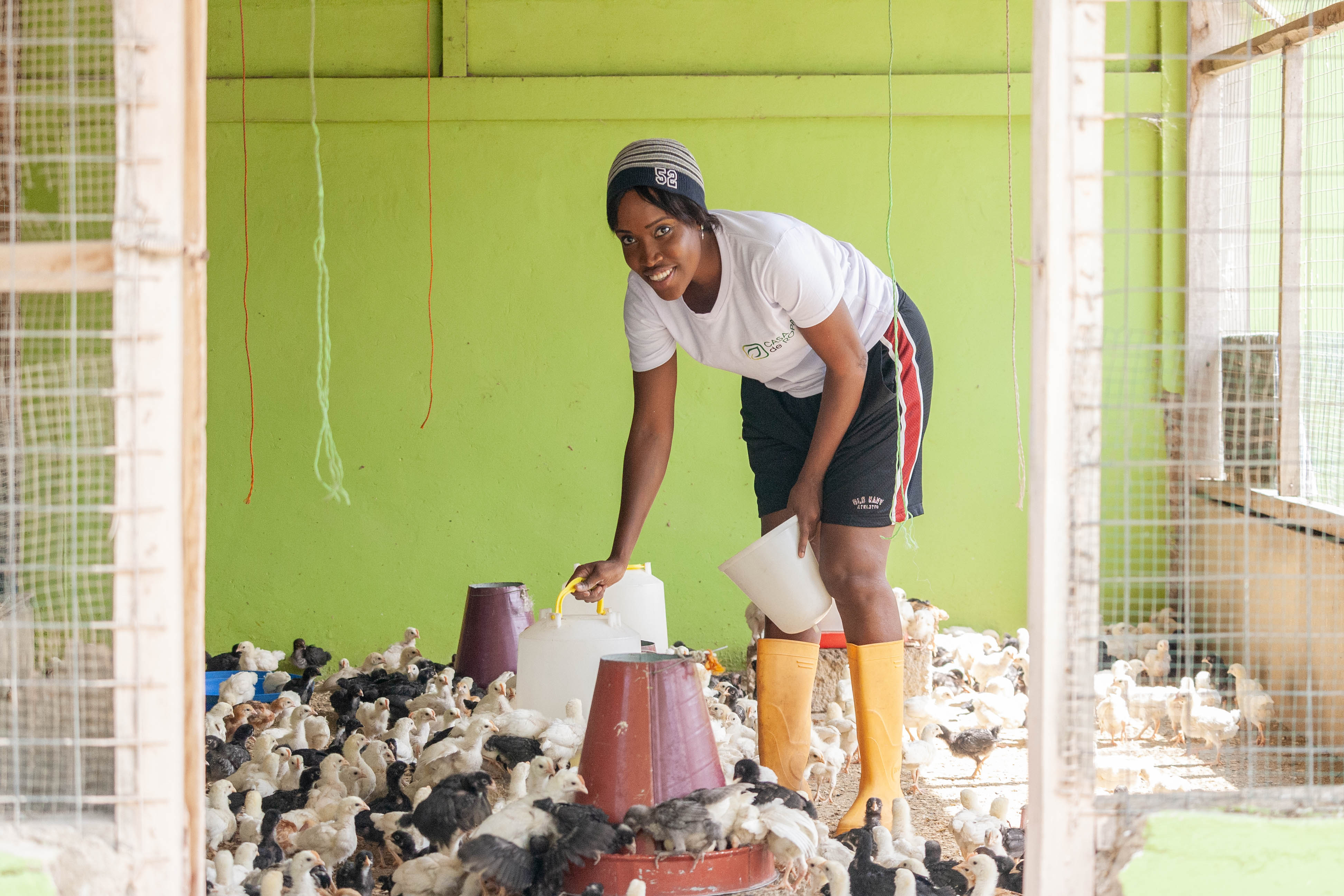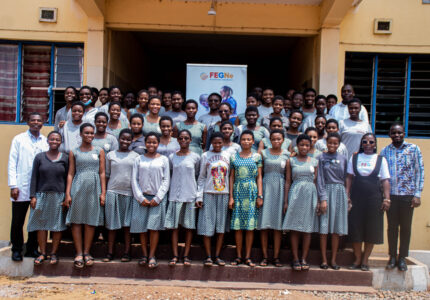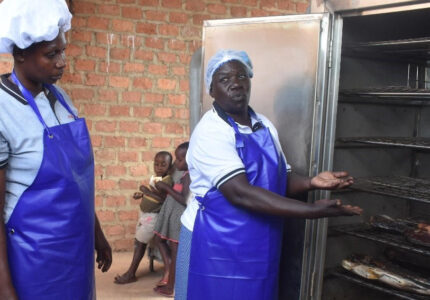Remember Queen Naliz – the lovely 26-year old poultry farmer who annexed the coveted Miss Agriculture Ghana Pageant in September last year? Yeah, I bet you do!
Well, we went knocking on her doors to do some catching up on what she’s been up to since her coronation. For your reading pleasure, loveforscience.com fans, just kick off your shoes, put your feet up, and enjoy the chit-chat!
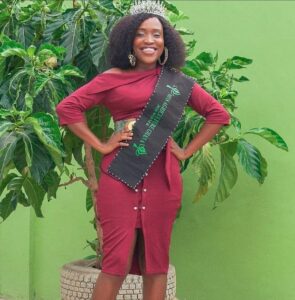
Piper: Hi, Queen Naliz! How’re you doing?
Naliz: I’m doing very well, thanks.
Piper: Kindly, briefly introduce yourself.
Naliz: My name is Perfect Liz Naa Sackitey, but I’m mostly known as Queen Naliz… Miss Agriculture Ghana, 2020/2021. I’m a poultry farmer, and I reside in the Awutu Senya East District of the Central Region.
Piper: How did you get into the MAG pageant in the first place?
Naliz: Errmm… It was through a friend. I saw the advertisement through a friend, and then I went on social media to research on it, and yeah, got into it.
Piper: Were you still in school at the time?
Naliz: No, I wasn’t. It was around the lockdown period; so I was just home, nothing much to do. I was done with school then. I actually did a course in Interior Design at a private institution, so I wrote the NVTI exams.
Piper: Wow… Interior Design to Poultry Farming! Quite the quantum leap. How did you develop that interest?
Naliz: (Laughs)… let’s say I developed the interest unconsciously because my Mum started our poultry farm, which is Treasure Farms over a decade ago. I vividly remember, I was fourteen or fifteen when my Mum started it, and so it transitioned from my Mum to my elder sisters…it’s like everyone in my family has kind of handled the business, and so it just fell to me automatically. So I’ve been running it for about four, five years now, and still doing so.
So, it’s just a part of me; I grew up learning about it and gaining more knowledge about it because it’s in our house.
Piper: Exactly. So you’re a proper farmstead girl.
Naliz: Haha… Yes, I am!
Piper: So, how’s the poultry doing now?
Naliz: It’s good. It comes with its own challenges but it’s good. Currently, I’ve about 400 layers, and it’s fine. After the MAG pageant, I did a few cockerels and broilers for Christmas; and now, I’m doing layers, so, subsequently, we’ll move ahead with more broilers maybe in September or something. So, it’s doing well.
Piper: You spoke of challenges… can you enumerate some of them…the most pressing?
Naliz: Errmm… the biggest challenge I have, or, we poultry farmers have, is with the feed – the cost of feed, and quality of the feed. We’ve been trying to get the Government to do a few things for us, like, subsidize the cost of the feed for us but it seems that isn’t working, and so we have challenges getting the feed, the quality of it – and also the price of the feed. Maybe today you can go buy it at Ghc154, tomorrow, you go, it’s Ghc157, the day after, it’s Ghc160…it isn’t helping to move our business forward and to boom that much. So, for me personally, that’s my main challenge, and I’ve heard other farmers; because I’m on other platforms on which have pig farmers, poultry farmers and the likes, complain of this very feed issue in particular. Everyone’s complaining about it. So, that’s the main challenge we have now but what can we do about it? We live in Ghana, so we have to adjust!
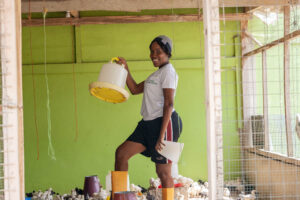
Piper: Exactly…exactly! I mean feed for all livestock farming is a big issue in Ghana!
Naliz: Yeah, very much so!
Piper: So you buy the ready-made feed?
Naliz: Yes. Yes.
Piper: Are you thinking of sourcing the raw material and processing your own feed any time soon?
Naliz: I remember a few years ago, my Mum used to do that and I tell you from personal experience and whatever she went through that, that isn’t easy! Like getting fishmeal, getting premix, getting maize – everything, before you go prepare the feed – the whole process is too much! So if you don’t have the resources up to that level yet to process your own feed like Ecko Feed Ltd. or people who have reached that level – I mean big poultry farms that can do that; process their own feed – I haven’t gotten there yet, so it’s not something I’m thinking of now. Because, if you are not careful, and you don’t do it well, it will affect your birds, especially layers.
Piper: Let’s talk about medical supplies and veterinary care for your birds – how accessible are those?
Naliz: Oh, those are accessible for us here because our poultry farm is part of the Kasoa Poultry Farmers Association, and the Accra Poultry Farmers Association, so we have dedicated Extension Officers and Veterinarians on call, so when it’s time for say vaccination, we just make a call and they avail us the required service.
Piper: Is that done for free?
Naliz: No! At a fee please, eeeiii…Nothing in Ghana is done for free! Hahaha!
Piper: Yeah!
Naliz: Actually, in 2 weeks from now, I will be doing de-beaking and second fowl pox vaccination for the birds, and for that, when the Vet comes around, taking into consideration the cost of the vaccination, transportation and everything, that will amount to not less than Ghc300 or Ghc400.
Piper: And how many times do you vaccinate your birds?
Naliz: Well, with layers, you vaccinate them 4 times throughout their egg-laying cycle. And so, if they are going to lay for about one and a half to two years basically, we are going to vaccinate them just like 4 times. But with their normal medications – antibiotics, vitamins and everything, we simply administer these to them weekly and so on, to boost them.
Piper: These extension officers and veterinarians – they are very cooperative?
Naliz: Of course, of course they are! Well, with the one we work with, he’s been working with us for over 5 years. He’s very cooperative, he’s very on-time, he does things very well. When he de-beaks our birds, in like 2, 3 hours, they stop bleeding, and are able to eat well. But we’ve not always really had it on point…we’ve had a few cases where some others have come around to do vaccinations that really didn’t go well – but this guy is really on point and consistent.
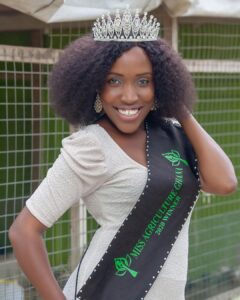
Piper: Hmm…that’s good to know. Errmm let’s talk about your production – on average, how much does a bird sell for?
Naliz: For the broilers, last year, I sold my birds for Ghc60 for live birds, and Ghc65 for dressed birds.
Piper: And spent layers go for the same price too?
Naliz: No, no…spent layers range from between Ghc30 to Ghc35 now.
Piper: A crate of eggs?
Naliz: A crate of eggs now ranges from between Ghc14 to Ghc18, depending on size of the eggs.
Piper: So, how many typical laying seasons do your birds give you?
Naliz: Well, we don’t have seasons per se. When the birds start laying, they are still pullets, and so the eggs are relatively small in size. As the birds grow in size and mature in age, say, from the sixth month, they produce bigger and bigger sized eggs and carry on that way for about a year; then their production starts going down because they are getting spent.
Piper: From your farm particularly, what’s your average egg production?
Naliz: Uh-hmmm… for quite a while now, we haven’t been producing layers, just broilers. But on average, let’s say 300 layers could produce 9 crates of eggs per day.
Piper: Whoa… you’re a big time farmer!
Naliz: (Laughter)
Piper: Do you have problems with disease, leading to high bird mortality?
Naliz: You know, with poultry farming, these things happen. But it depends to a large extent on you the farmer – if you take good care of your birds, give them the right medication, administer their vaccinations on time, you may not prevent casualties completely but you could lower this to about one or two percent.
It’s possible you might not even have birds dying at all – there are times we’ve raised broilers and even layers without losing even a single bird. So, if you administer their medications and vaccinations on time, feed them well and on time, provide them clean drinking water – you may not totally prevent casualties but you could very well lower that to two percent or one percent.
So for farms that have high bird mortality rates, I can say it’s due mostly to the negligence of the farmers. Because it isn’t the birds that take care of themselves; you take care of them.

Piper: Interesting! Okay, let’s get back to you. You entered into this contest (MAG202/21) – at the grand finale, there were how many of you?
Naliz: At the grand finale, there were 5 of us.
Piper: Right! So, what project did you so compellingly pitch before the panel of judges that they just had to put that crown on your head?
Naliz: (Laughs) Well, let’s say, I just continued with what my Mum has been doing over the years, and then I just added a little bit of something.
What I added to my project was, getting other people involved in poultry farming, especially women. So, that was mainly my strong point, with just a few things here and there. So, it wasn’t anything different from what I had been doing over the years. It was just empowering a lot of people, especially women to get into poultry farming. Yeah, so, that is it.
Piper: So, you got crowned in September last year. This is June – so it is like 9 months down the line. What has the story been so far with regards to empowering women to go into poultry farming, and everything else that was a part of your project?
Naliz: The story has been good so far, especially after I attended the 2020 National Farmers Day celebration; which I am very very grateful to Miss Agriculture Ghana for. That trip changed my life totally – I got to meet a lot of people in the poultry sector, and indeed those from other sectors of agriculture, and it has really really helped me. Quite a lot of people got to know my brand in Techiman, and stuff like that. I also got other people involved in poultry farming; I have got 4 people involved who have set up good poultry farms now and are doing well and are still going on with that…so, it has been good!
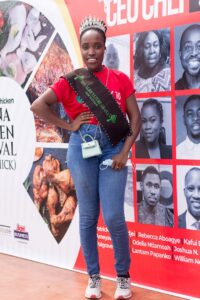
Piper: Your attendance at the National Farmers Day celebration – was that by invitation, or it was a personal trip you chose to embark on, on your own?
Naliz: It was sponsored by Women In Agriculture Development (WIAD), under the Ministry of Food and Agriculture (MoFA).
Piper: Did you receive an award there?
Naliz: No, no, I didn’t.
Piper: So, it was basically a fraternizing and networking thing?
Naliz: Yes, yes, that is what it was.
Piper: How many women have you personally empowered to go into poultry farming?
Naliz: Personally, 3 women and 2 men.
Piper: And you are closely with them now?
Naliz: Oh, yes. And they are actually doing so well, they don’t even need my help now. (Laughs) So, they are actually doing well!
Piper: Are they all in or around the Awutu Senya East District?
Naliz: No, not all of them are here in my vicinity. What I do that helps me mentor people a lot, is social media. I interact a lot with people, so, you don’t actually need to be in my vicinity in order for me to interact with you. I remember a man somewhere at East Legon or Oyarifa – he actually even came here to collect some birds that I had ordered for him. I just gave him a few tips here and there, and my Mum helped out; and his farm is doing very very well. His layers started laying way back.

Piper: I should definitely be getting some of those tips from you and Mum… I intend to set up a small poultry too, nothing big for now – obviously not 400 birds…
Naliz: (Laughs) Oh yeah, you can start with 50 or 100 birds, and just learn on the job…that should do.
Piper: Where do you source your birds from?
Naliz: That’s Nicholas Farms & Feeds. That’s where I get my birds, and also my feeds from. It’s right here in my vicinity, so I don’t need to go anywhere far.
Piper: You buy day-old chicks?
Naliz: Yes, yes, we do.
Piper: What’s the average cost of a day-old layer, broiler and cockerel?
Naliz: Errmm…a layer – a brown layer is now Ghc9.50, and a broiler is about Ghc8, a day-old cockerel is about between Ghc2 to Ghc2.50, the last time I checked.
Piper: You mentioned the ‘brown layer’. Are you colour-specific when buying your birds?
Naliz: Yes, yes, because they all have their advantages and disadvantages. With layers, we have the brown, the black and the white birds. Mostly, I would go for the brown or black birds, and especially the black ones – they lay a lot. They can lay for up to 2 years. Yeah, so, I am very colour-specific.
Piper: So you have black layers?
Naliz: Oh, yeah, I have black layers right now, as we speak.
Piper: Oh, okay. But you don’t seem to like the white layers. Are they problematic, right?
Naliz: Uh-mmm… I don’t like the white layers. They are very fragile – as you said, problematic they are. If you aren’t lucky, you could lose everything! Plus, they don’t lay to your satisfaction. I had a farmer here, who had both the brown and white layers; he complained so much about his white layers. But hey, everyone has their preference.
Piper: So, in your estimation, what colour of birds are best – cockerels, broilers, layers?
Naliz: For cockerels, the black and white spotted ones are fine. They are very strong. Same for layers. As for broilers, they are all white.
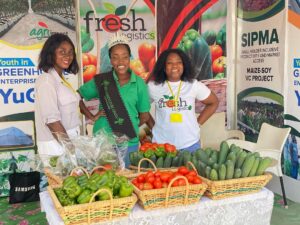
Piper: Oh, that is it – broilers are all white? Interesting!
Now, let’s see in your 9-month reign so far, you have successfully mentored 5 people to set up their own poultry farms, worked closely with them, and they are doing well; standing firmly on their own now. When do you intend taking on the next batch of protégés?
Naliz: Okay, the truth of the matter is that I don’t work only with poultry farmers. Right now there is a school here in the Central Region called Richmens Complex International School, and their director reached out to me to come help start up a poultry farm form the school because they want to stop buying imported frozen chicken and eggs.
And so, from this week until next week, we will be building the structure, then we get the birds to start the project. They have workers who will take care of the birds, so, I will give them knowledgeable skills on how best to cater for the birds. I will then be supervising the vaccinations and stuff like that.
But added to what I do in with poultry, I work with other farmers – crop farmers. I have actually worked with a ginger farmer in Adooso, and his farm is now doing well. So, it isn’t basically working with poultry farmers. I work with other farmers too.
Piper: Wow! The structure you are putting up for this school now, what kind is it battery cage or deep-litter?
Naliz: I am actually still in talks with the director to see if we can do the battery cage type. Yeah, so we are still in the planning phase of the project.
Piper: What system do you use at Treasure Farms – battery cages or deep-litter?
Naliz: We do the deep-litter.
Piper: The first and second runners-up respectively, were Patience Okpati, a snail farmer, and Leticia Maame Nuamah, a nutritionist, right? Are you in touch with one another?
Naliz: Oh, yes, yes, I am – but not really with the first runner-up but mostly with the second runner-up. I don’t know what it is they say about pageants, that mostly, the first and the second don’t really get close; it is the first and the third…so, yeah, I think that is what is happening with us (laugh). But we are all on a common group page, so we interact here and there.
Piper: They are both doing well in their businesses?
Naliz: Yes, yes, they are, thankfully.

END OF PART ONE

